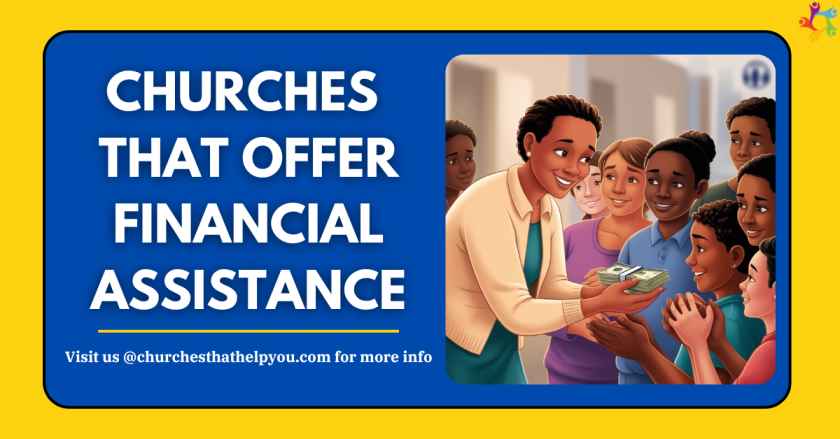In times of economic struggle Churches play an important role in helping communities by providing necessary support. The church offers many forms of assistance, such as rental assistance, utilities, food, and more. This guide explores how financial assistance churches can be a lifeline for those in need.
Churches are central to many communities, often filling gaps other organizations can’t address. Through compassion-driven outreach, many churches provide aid to struggling families and individuals. From financial support to spiritual guidance, churches strengthen their communities and provide vital resources that help people regain stability.
Types of Financial Assistance Offered by Churches
Churches extend a variety of services to meet different needs in the community. The type of assistance available often depends on the church’s resources and outreach focus, but common types include:
☑️Emergency Rent and Utility Support
One of the most common forms of assistance that churches provide is assistance with rent and utility bills. This help may be necessary for families on the verge of eviction or struggling to keep their lights on. The church works with local homeowners and utility providers to negotiate payment plans or provide partial financial assistance to relieve households of the immediate burden.
☑️Food Assistance and Meal Programs
Many churches organize food pantries, meal programs, or food distribution services. These programs aim to provide nutritious food to families, seniors, and individuals facing food insecurity. Churches often partner with local food banks and community organizations. This ensures a regular food supply, and sometimes the food is even delivered directly to your home.
☑️Transportation and Fuel Assistance
Transportation costs can be a major challenge. This is especially true for those who rely on public transportation or need gas money to travel. Some churches offer travel assistance or transportation tickets for individuals who need to travel to work, school, or medical appointments. This support can be life-changing, enabling people to maintain employment or access essential services.
☑️Medical Bill Assistance and Health Services
A handful of churches offer help with medical expenses, such as prescription costs, medical bills, and even mental health counseling. These services are especially beneficial for uninsured or underinsured individuals overwhelmed by healthcare costs. Some larger church organizations may even run free clinics staffed by volunteer doctors and nurses.
☑️Educational and School Supplies
Supporting education is another priority for churches, particularly those with youth programs. Churches often provide school supplies, tutoring, scholarships, or support for after-school programs. This assistance helps relieve financial strain on families and promotes a positive learning environment for children.
- Also read: Churches That Help Financially Near Me
Top Churches Offering Financial Assistance
Various churches and religious organizations provide essential support when people face financial hardships. These faith-based groups operate through donations, community partnerships, and grants, enabling them to offer resources such as housing aid, utility bill assistance, food distribution, and more. Here are some leading churches and religious organizations offering financial aid across the U.S.
Catholic Charities
Catholic Charities is one of the largest faith-based humanitarian organizations, with branches throughout the United States. Their services include a wide range of needs, from emergency financial assistance for rent and utilities to food pantries, health care support, and job training programs. Catholic Charities also provides immigration and legal services and helps marginalized individuals and families regain stability.
The Salvation Army
The Salvation Army is well-known for its commitment to providing essential services such as emergency shelter, food aid, rent and utility bill assistance, and job training programs. They operate various programs to address housing insecurity and food scarcity, including holiday food and gift distributions, rehabilitation services, and disaster relief efforts.
Lutheran Services in America
Lutheran Services in America is a large network of Lutheran organizations providing health, housing, and financial support to those in need. Their programs include support for low-income families, senior care, disability services, and mental health resources. Lutheran Services also works to alleviate homelessness and poverty in communities nationwide.
Episcopal Community Services
Episcopal Community Services (ECS) provides financial assistance, housing assistance, employee training, and food distribution programs. They emphasize community empowerment, providing educational resources family support services, and helping the homeless. Many ECS branches work closely with local non-profits and government agencies to expand their reach.
United Methodist Church (UMC)
The United Methodist Church is dedicated to social outreach, supporting low-income families, children, and individuals in crisis. UMC provides rental and utility assistance, emergency housing food distribution, and disaster response through various ministries. Many UMC programs focus on community building and long-term stability for recipients.
St. Vincent de Paul Society
The Society of Saint Vincent de Paul works through local Catholic parishes and provides substantial assistance to individuals facing poverty. Their services also include emergency financial assistance, housing support, food distribution, and assisting with furniture or clothing. They aim to provide immediate relief through personal assistance and promote self-reliance.
Jewish Family Services (JFS)
Jewish Family Services is a non-profit organization offering financial assistance to those in need, regardless of religious background. JFS provides rent and utility assistance, food pantries, mental health counseling, and employment services. Their mission is to strengthen communities by supporting families and individuals facing hardship.
The Presbyterian Church (USA)
The Presbyterian Church provides financial assistance through various community programs focused on addressing housing insecurity, hunger, and emergency needs. Many Presbyterian churches also offer outreach services such as food banks and low-cost counseling. and educational resources for children and families.
These churches and faith-based organizations are known for their dedication to serving their communities by providing critical resources to those who are struggling. Reaching out to these organizations can be a vital step toward finding stability and relief in difficult times.
Churches that offer financial assistance act as pillars of support, creating pathways for individuals and families to overcome challenges and regain independence.
- Also read: Charities that Help Students Financially
Step by Step Application Process for Financial Assistance
Applying for financial assistance through churches or faith-based organizations can be a straightforward process if you follow the proper steps and prepare the necessary documents.
Here’s a detailed guide to help you navigate the process effectively:
✅Identify Churches or Organizations Offering Assistance
Start by researching churches or faith-based organizations in your area that provide financial assistance. Use tools like:
- 211.org: A national directory of local resources.
- Church websites or social media pages.
- Community centers or local government offices for referrals.
Many churches list their services online, including eligibility requirements and application details.
✅Contact the Church or Organization
Once you’ve identified potential churches, reach out to them. You can:
- Call their office directly to inquire about available programs.
- Visit in person to speak with a staff member or volunteer.
- Check their website for an application form or further details.
When contacting the church, ask about:
- The types of assistance they offer (e.g., rent, utilities, food).
- Any specific eligibility criteria or documentation required.
- Timelines and steps involved in the application process.
✅Verify Eligibility Requirements
Churches typically prioritize helping those in immediate need, such as:
- Low-income families.
- Individuals facing eviction or utility disconnection.
- Those with unexpected medical or financial emergencies.
Ensure you meet their criteria by confirming income limits, residency requirements, or any other conditions.
✅Gather Necessary Documents
To complete your application, you’ll need to provide documentation. Commonly required documents include:
- Proof of identity: Government-issued identification, such as a driver’s license or passport.
- Proof of income: pay stub, tax return, or unemployment benefits statement.
- Proof of residence: rental agreement, utility bill, or other documents showing your address
- Bill or Notice: Notice of Eviction Utility Disconnection Warning or medical bills
- Bank Statements: To show current financial standing, if required.
Make sure all documents are current, legible, and properly organized.
✅Submit Your Application
Follow the church’s specific guidelines for submitting your application. This could involve:
- Online Submissions: Many churches now allow applicants to complete forms and upload documents via their website.
- In-Person Applications: Visit the church office during designated hours to submit paperwork and discuss your needs.
- Mail Applications: Some organizations accept applications through traditional mail, though this may take longer.
Be thorough when completing the form. Double-check all information for accuracy before submission.
✅Follow Up on Your Application
After submitting your application, follow up to ensure it has been received and is under review. You can:
- Call or email the church to check the status.
- Ask about estimated timelines for decisions.
- Inquire about the next steps, if any, such as additional documentation.
- Also read: Churches that Help with Financial Assistance
Alternative Resources for Financial Aid
If churches aren’t enough, here are other options for financial assistance:
✔️Government Programs
- TANF: Cash for basic needs.
- SNAP: Food assistance for low-income families.
- LIHEAP: Help with heating/cooling bills.
- Section 8: Rental assistance.
Visit your local Department of Human Services to apply.
✔️Community Action Agencies (CAAs)
Nonprofits offering:
- Emergency financial aid.
- Job training.
- Housing and utility help.
Find one via the National Community Action Partnership (NCAP) website.
✔️Local Nonprofits
Nonprofits like the United Way or Goodwill often assist with food, rent, and bills. Check with local groups for support.
✔️Online Crowdfunding
Platforms like GoFundMe and Fundly allow you to raise money for urgent needs from friends and strangers.
✔️Charities and National Organizations
- Red Cross: Emergency aid.
- United Way: Rent and utility help.
- Feeding America: Food banks.
These resources provide essential support when facing financial hardship.
Conclusion
Churches that offer financial assistance play an invaluable role in society, helping individuals and families through challenging times. These faith-based organizations foster hope and stability by providing housing aid, food, healthcare, and more. For anyone in need, reaching out to a local church can be the first step toward a brighter future.
FAQs
How can I find churches that offer financial assistance?
To find local churches that provide financial aid, call nearby churches or visit their websites. You can also use directories such as 211.org or community resource centers.
What documents are needed for financial assistance?
Typically, you will need proof of income, identification, residence verification, and any bills or notices relevant to the type of aid you request.
Can I receive help from multiple churches at once?
While possible, some churches may limit aid to ensure resources are distributed fairly. Be upfront with each church about any other aid you’re receiving.
How long does it take to receive assistance?
Timing varies, but many churches offer immediate support for urgent needs like food and utilities. For larger aid requests, such as rent assistance, the process may take longer.
- Help with Emergency Vet Bills – Exclusive Tips to Get - March 28, 2025
- Charities That Offer Emergency Help Paying Car Insurance - March 25, 2025
- Top Churches That Help With Rent Jacksonville FL – Get Rent - March 6, 2025



